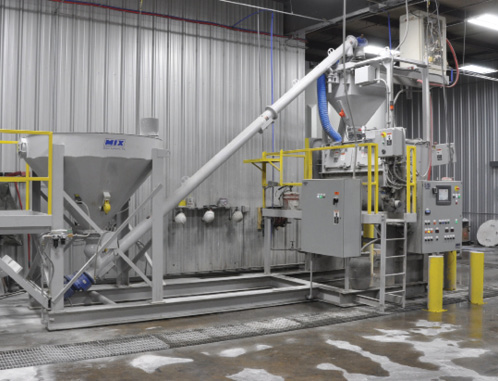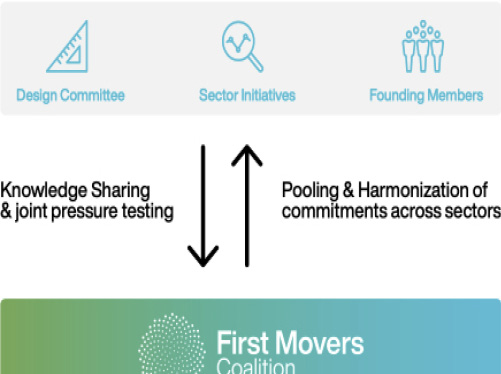Sources: BOM Financial Group, Toronto The Bank of Montreal has committed to purchase carbon credits over five years, representing 5,750 metric tons of carbon dioxide removal and reductions, via an agreement with Halifax-based CarbonCure Technologies. The credits are expected to be delivered on September intervals through 2026. Carbon neutrality-minded BMO is the first North American bank to purchase CarbonCure carbon…
Read MoreTag: emissions
Feds earmark $100M to decarbonize cement, companion industries
Sources: U.S. Department of Energy; CP staff The Department of Energy’s (DOE) new “Industrial Decarbonization Roadmap” identifies key pathways—Energy Efficiency; Industrial Electrification; Low Carbon Fuels; Carbon Capture, Utilization and Storage—to reducing carbon dioxide emissions in Cement, Iron & Steel, Chemicals, Food & Beverage, Refining and other manufacturing sectors that collectively account for 30 percent of the United States’ annual CO2 load.
Read MoreThe Simple Value of Ultra-High-Performance Concrete UHPC mixes can significantly reduce costs and carbon footprints.
Albert Einstein famously mused “If you can’t explain it to a 6-year-old, you don’t understand it yourself.” This can be applied to how many in the construction industry view ultra-high-performance concrete, or UHPC. While this type of concrete has been around for a long time, it is often dismissed as a complicated and expensive option. “It’s complicated” may not be…
Read MoreSteelmakers delineate low vs. high CO2 emissions production methods
Sources: Steel Manufacturers Association, Washington, D.C.; CP staff A Steel Manufacturers Association (SMA) study concludes that the output of electric arc furnace (EAF) steelmakers in the U.S. has a carbon intensity approximately 75 percent lower than that of peers running traditional, coal-fueled blast furnaces. Large operations deploy the latter to melt raw materials into iron, then process it into steel.…
Read MoreMultinational cement players team to back six carbon management consortia
Sources: Global Cement and Concrete Association, London; CP staff An unprecedented research, development and commercialization project under the Global Cement and Concrete Association aligns multinational producers and proprietors of technologies aimed at streamlining or capturing and utilizing carbon dioxide emissions from cement plants or other major industrial sources. The project teams permutations of major European, Latin American and Asian cement…
Read MoreCalPortland, Cemex, Ozinga, PCA earn Energy Star Partner recognition
Sources: Portland Cement Association, Washington, D.C.; CP staff Four familiar names in construction materials are among 210 U.S. Department of Energy and Environmental Protection Agency 2022 Energy Star Partner of the Year Award recipients. The 2022 Partner naming marks 18 consecutive years of such recognition for CalPortland, four years for Cemex, and three years for Ozinga and PCA.
Read MoreCalPortland Mojave plant all in on portland-limestone cement
Sources: CalPortland Co., Glendora, Calif.; CP staff CalPortland plans full conversion of its 1.3 million ton/year capacity Mojave plant, located 75 miles north of the Los Angeles Basin, to the branded Advancement HS portland-limestone cement. Scheduled for completion by the third quarter, the switch from ordinary portland to Type IL cement will reduce the facility’s carbon emissions by 10 percent…
Read MorePCA offers feds an industry decarbonization reality check
Sources: Portland Cement Association, Washington, D.C.; CP staff Federal policy is vital to accelerate deployment of technologies that can curtail industrial sector carbon dioxide emissions, Portland Cement Association contends in response to the U.S. Department of Energy Advanced Manufacturing Office’s (AMO) “Request for Information on Industrial Decarbonization Priorities.”
Read MoreCemex, Holcim, tech giants charter procurement, supply chain coalition
Cemex S.A.B. de C.V. and Holcim AG are First Movers Coalition (FMC) founding members, joining Amazon, Apple and nearly two dozen other major companies to accelerate development of early-stage decarbonization technologies through procurement and supply chain management practices. FMC will work across eight key sectors, seven of which—cement, steel, aluminum, chemicals, shipping, aviation and trucking—account for more than a third…
Read MoreCemex, Holcim, tech giants charter procurement, supply chain coalition
Sources: Cemex S.A.B. de C.V., Monterrey, Mexico; Holcim AG, Zug, Switzerland; CP staff Cemex S.A.B. de C.V. and Holcim AG are founding members of the First Movers Coalition (FMC), joining Amazon, Apple and nearly two dozen other major companies to accelerate development of early-stage decarbonization technologies through procurement and supply chain management practices. FMC will work across eight key sectors,…
Read More

